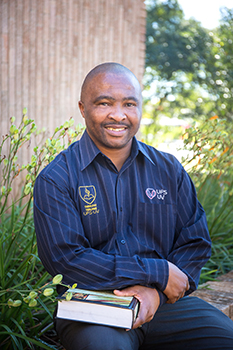
Dr Joseph Pali received his joint
doctoral degree at the Vrije University,
Amsterdam.
Photo: Anja Aucamp
Dr Khamadi Joseph Pali is the coordinator of the Higher Certificate in Theology at our university’s Faculty of Theology and Religion. This course focuses on Biblical hermeneutics, Christian leadership, African theology, and pastoral care for students who have a passion for the ministry. In addition to this responsibility, he participated in a collaborative doctoral programme with the Vrije University (VU) in Amsterdam, Netherlands, from 2011 till December 2016.
What is the theme of your doctoral thesis?
“The theme of my PhD thesis is Leadership and Transformation in the African Church: A Practical Theological Study of One Denomination. The Dutch Reformed Church in Africa in the Free State region was used as a case study. The study was an attempt to understand what kind of leadership transformation is needed.
Please describe your journey from the UFS to the Netherlands?
“My completion of this joint PhD programme is monumental, and a historical achievement for me and the Faculty of Theology and Religion. After completing my master’s degree in 2009, I was employed by the then Department of Practical Theology. Prof Kobus Schoeman, my head of department, proposed that I enrol for this programme. I agreed, viewing it as an opportunity to learn, empower myself, and be exposed to new study experiences.”
What did this learning experience mean to you?
“For me, it was an opportunity from God, enabling me to help my church and its members. It was also a reward for my hard work, and I grabbed the opportunity to learn from the best with both hands. My interaction with various scholars at the VU during my visits to Amsterdam was especially rewarding. The experience made me develop an open mind, interdisciplinary approach, and critical reflection.
In my teaching responsibilities, I focus on Africa as our context of study. Learning about our past and how to effectively engage that legacy, especially in South Africa, is a measure of success in our academic and ministerial training. I intend to delve into transformation from the Christian and African perspective to understand what is needed for the practice of Christian religion and to drive transformation in the African context.”